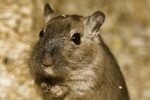Have you ever heard about Degu? Degu is an interesting animal. Degu is a member or the Octodontidae family of rodents and sub-order caviomorph, which is making them technically related to chinchillas and guinea pigs. However, recent studies show that they are closer to rabbits instead!
Degus originated from Chile. You can easily find them anywhere, from the sandy coastal area to the high Andes mountains! In the wild, they are communal animals who live in groups of up to 100, with complex burrows as food storage and place to sleep or rest. Unlike the majority of rodents, Degus are diurnal animals who are more active during the day.
The adult Degus’ body is about 15 centimeters. One of the distinct features of Degus is their super long tail with a tuft at the end of it. This long tail almost has the same length as their body itself! Their natural coat’s color is mid to dark brown, with white feet and cream belly.
Even though the wild Degus have only one to two years of life span, the pet Degus are still great for a companion because their life span can expand until about five to nine years.
Interested? Then let’s talk about Degus as a pet and how to take care of them so they can have a long lifespan.
What Makes Degu Has Long Live to Survive?
Generally, the key to a long life for a pet is how we take care of it. If we take care of our pets correctly and let them live in an adequate environment, then they can live longer! So does with Degu. We can have a long live Degu as long as it is provided with healthy food and proper treatments.
Preparing the Degu’s home
The best temperature for Degus to live is below 20 degrees Celcius. They can live in an extremely cold condition too, as long as it is not wet or damp. As active animals, you have to provide them with plenty of space and levels so they can run around and exercise. Your Degus will also love to have some toys, like exercise wheel, ball, or tunnels to play with!
They also like to dig for a burrow so you may want to cover their floor cage with some type of dust- extracted bedding and bark chippings, or a digging box filled with sand and organic soil.
Just like other types of rodent, Degus also love to chew a lot! Therefore, you have to make sure that their furniture’ and toys’ materials are safe for them. You can also go extra by giving them some type of chew toys for rodents. Woodblocks and mineral block for rodents are also great as well!
Knowing Degu’s personalities and behaviors
You can treat them right if you know them well enough. Knowing their personalities and behaviors (which can be different from each Degus) can help you to tell what they like and don’t. Basically, Degus are easy to tame, especially if you have them from an early age. They are curious, playful, and love to be active, especially during the day due to their diurnal behavior. By ‘love’ it means that they not only enjoy it but more than that: they need it badly. Without enough chance to exercise, Degus can become aggressive or even neurotic, and let us tell you: you will not like it.
In the wild, they live in a community, so they should not be kept alone without any companions. Degus are one of some type of rodents who can get along with the others, as long as it is in the same sexed-pairs (or they will likely fight each other!). So, let them interact and play around together!
Degus are also friendly to humans. They can come to you for a cuddle or belly scratch, or even ‘talk’ to you in a chitter-chatter! Degus may love human interaction, however, they don’t really like being handled a lot so Degus are not suitable to be a pet for young children.
Healthy foods for Degu
Preparing a healthy and balanced diet plan for your Degus is important. Some of the best types of foods that you can give to Degus are a mix of chinchilla and guinea pigs pellets (make sure it has no molasses in it!), hay, peeled sweet potato, leafy veggies, and dandelions.
There are also some types of food that you have to avoid because your Degus cannot digest it well, which are cruciferous vegetables, like broccoli, brussels sprouts, cabbage, and kale; and fruits with high sugar levels because Degus are prone to diabetes.
Grooming for Degu
You can tell your Degus are healthy from their looks. Healthy Degus have bright, clear eyes, clean ears, glossy-looking fur, clean tails, and yellow teeth! Yes, instead of white, healthy teeth for Degus is yellow teeth because the white one might indicate a vitamin A deficiency. They also should not have wetness around their mouths. The wetness can be a sign of overgrown teeth, so be careful!
Common Health Problems in Degu
It’s obvious that if you want your Degus to have a long lifespan, you have to prevent them from getting sick. Degus are prone to diabetes so cut off their sweet treats and keep their diet plans healthy. Another common health problem is bumblefoot from a wire floor cage, so make sure you only provide them with the solid bottom one since the bumblefoot problem can take a long time to heal!
Your degus can also suffer from dry skin when they don’t have dust baths regularly, mouth and dental problems when they don’t have proper stuff to gnaw and chew on, and also respiratory problems and get injured from a fight.
That’s all about how to take care of Degu so it can have a long life. Remember that a healthy Degu is a happy Degu!

